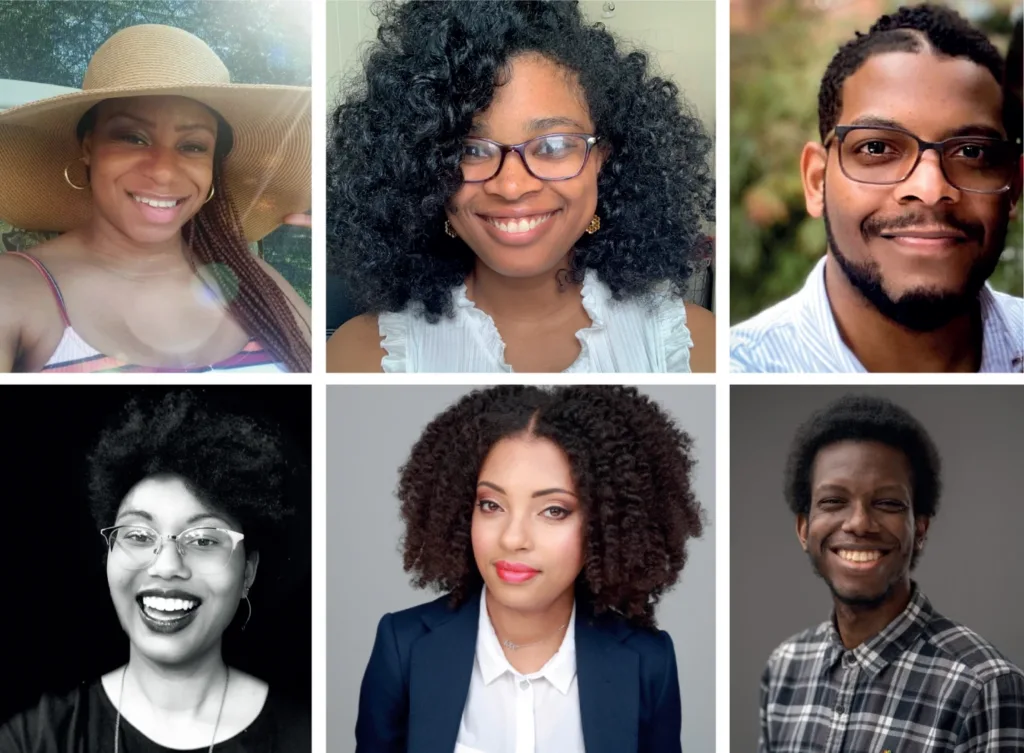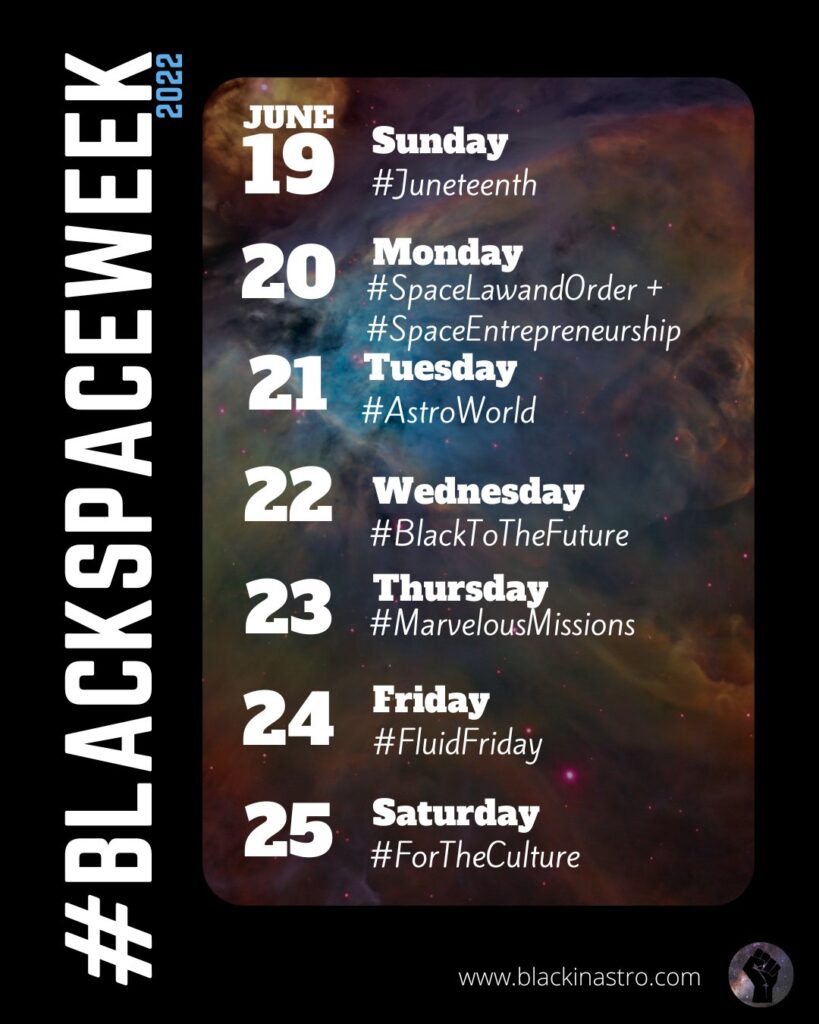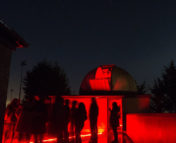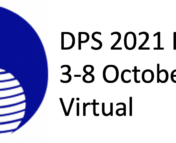This week, we will be covering Black in Astro’s #BlackSpaceWeek, a virtual conference happening from June 19 through the 25th that features panels, talks, art, giveaways, and various other virtual events to celebrate Blackness in astronomy and space science. Most of our coverage will involve live-tweeting events, along with another post next weekend to recap the week!

Who are Black in Astro?
Nature recently featured a piece describing the history, growth, and impact of this organization since its inception in June 2020 by Ashley L. Walker, a PhD student studying atmospheric science at Howard University (Figure 1, top left). “I founded Black in Astro (BIA) [. . .] with the primary goals of providing community, support and scholarship to Black astronomers,” explains Walker. “In addition to these goals, we also want to continue celebrating Blackness within space-related fields and to reconnect with the origins of our ancestors, who often used the stars for guidance, freedom, farming and storytelling.” Walker and other organizers emphasize that they wish to celebrate all Black members in the space science community, which includes not only published scientists but also junior scientists, data scientists, telescope operators, administrators, organizers, janitorial staff, and everyone else who directly contributes critically to scientific progress.
This Nature article features writings from six leaders of BIA on their experiences with the space science community and the BIA community. The article begins with Walker discussing her motivations for founding BIA and recounts the impact that some of her mentors, such as Dr. Jedidah Isler and Dr. Nia Imara, had on her career. “It was the communal support and advocacy of Black astronomers that kept me in my field,” notes Walker. “Dr. Imara continues to inspire me to continue to take a stand for underserved groups while Dr Jarita Holbrook and Dr. Lynnae Quick push me to be the best version of myself as an astrochemistry and planetary science researcher.” Walker proceeds to highlight the startlingly low number of Black individuals, particularly women and non-binary people, with PhDs in Astronomy in Planetary Science. “Currently, there are only 23 Black women who have obtained PhDs in Astronomy and about 15 Black women with PhDs in Planetary Science within the United States.” Black people have been and continue to be excluded from academia, astronomy, and space science, and for this reason, BIA convened to provide networking and support for Black astronomers and space scientists and celebrate the successes of Black scientists in the space- and space-adjacent fields.
“A true celebration of Black astronomers from across the diaspora”
Next, Bryné Hadnott, MSc, Data Curator and STEM Storyteller at Stanford University, recounts the doctoral defense of Dr. Jamila Pegues, a momentous event for Black representation in astronomy as Dr. Pegues became “the first Black woman to graduate with a doctorate from Harvard University’s astronomy department in its almost 200-year history.” Hadnott then discusses the recent movement for Black astronomers to speak publicly on their experiences with alienation and isolation in academia, particularly in the astronomy and physics communities. This movement began with the open letter by Lauren Chambers where she discusses the moral disconnect between the astronomy field and the terrestrial, human world as well as the neglect faced by many of her Black and brown peers. Hadnott then highlights the work of the American Institute of Physics Task Force to Elevate African American Representation in Undergraduate Physics and Astronomy (TEAM-UP), which ultimately reported on five key areas that contribute to the retention (or lack thereof) of Black astronomers and physicists in graduate schools and provided recommendations. She concludes with recounting the joyous celebration that was BIA Week 2021: “BIA created a true celebration of Black astronomers from across the diaspora. And a moment, finally, for all of us to breathe and be our whole, authentic, astronomy-loving selves.”
Dr. Ronald S. Gamble, Jr., Theoretical Astrophysicist at NASA Goddard Space Flight Center who earned his PhD in Theoretical Astrophysics from the North Carolina Agricultural & Technical State University, agreed with Hadnott’s sentiments: “Last year’s BIA Week 2021 was phenomenal. It was a full immersion into the blended culture of scientific research and societal impacts of African-American astronomers and astrophysicists and where we stand as a thriving community of influential scientists.” In Gamble’s piece of the article, he describes his countless experiences with racism and discrimination in astronomy for being Afro-Latino with a PhD from a Historically Black College/University (HBCU). “A question that always resonates and reverberates in diversity conversations is: ‘where are all the Black faculty members?’” notes Dr. Gamble. “According to the American Institute of Physics on the disparities of African-Americans in physics and astronomy, approximately 9.3% of all PhD-granting physics/astronomy departments employ at least one African-American faculty member. There is not a single standalone astronomy department at an HBCU.”
“It gave me hope that I had a place in this space”
Next, Caprice Phillips, MSc, astronomy PhD student at The Ohio State University (OSU), recounts having to endure isolation, microaggressions, and racism in several astronomy academic environments, such as her undergraduate institution and her first graduate institution, where she was pushed out and failed by her mentors and community. “I often felt isolated and it was hard for me to not see folks that looked like me doing something I was interested in. It was not until 2016 that I saw and took a class with another Black woman in astronomy. I was so stoked because I had never seen another Black person in astronomy before! It gave me hope that I had a place in this space,” notes Phillips. “I think BIA came along at the right time for me because it has been great to find community and support. It is so important to have spaces and communities that I can lean on and learn from.” Later on in the article, Phillips discusses what’s next for BIA. She details a grant proposal that she wrote with Dr. Laura Lopez to support ongoing programs, scholarships, and research competitions (the first having occurred this past fall) at OSU to support and celebrate Black astronomers.
Next, KeShawn Ivory, MSc, astrophysics PhD student at Vanderbilt University, describes the impact that BIA has had on him and the critical need for its existence. “I knew before I even started undergrad that there wouldn’t be very many other Black students in the physics and astronomy department at my school [. . .] It was difficult not to feel at least somewhat disheartened when I would tell fellow Black undergrads what my major was, only to have them say ‘Wow! I could never.'” Ivory explains that it was at one of his first meetings after joining the leadership team of BIA that he realized the potential and impact of having a network of people who understood and could relate to his experiences as a Black astronomer. “The cultural references. The dialect. The fashion. The music. Everything we are exposed to as people forms a social and cultural landscape in which our lives are situated, and working on astronomy issues with people positioned in similar landscapes was incomparable.”
Finally, Cheyenne Polius, MSc, data scientist, astrophysicist, and president and co-founder of the St. Lucia National Astronomy Association, recounts the isolation she experienced as the only Black woman in her year and the important role that BIA has played in providing her with the connection to community that she was missing. “What seemed like a simple Twitter hashtag to some was the beginning of a vital movement to show the world that we exist and to support our community in the ways that matter. [. . .] Seeing people who look like you in the spaces you occupy or the spaces you want to be in can give you the confidence you need to reach your full potential. This is what the BIA community has done for me.”

What’s in Store for #BlackSpaceWeek?
Today (Sunday, Juneteenth, 2022) is the Twitter-based #RollCall event. Using the hashtags #BlackinAstroRollCall and #BlackSpaceWeekRollCall, members of the Black space community will be introducing themselves. This is a great way to celebrate Black astronomers, planetary scientists, space scientists, administrators, organizers, staff, and other critical community members that help make space science possible. Be sure to take a look, add to the roll call, retweet other’s roll calls, and join in on the celebration!
The rest of the week will feature different themes each day (see Figure 2), ranging from space law and economic policy, cultural astronomy, space missions, career advice and panels, giveaways, and more! Check out this Twitter thread for the full schedule of events, and follow @BlackinAstro to get the most up-to-date notifications on the various events and happenings!
Astrobite written by: Catherine Manea
Astrobite edited by: Pratik Gandhi and Sahil Hegde
Featured image credit: Black in Astro



